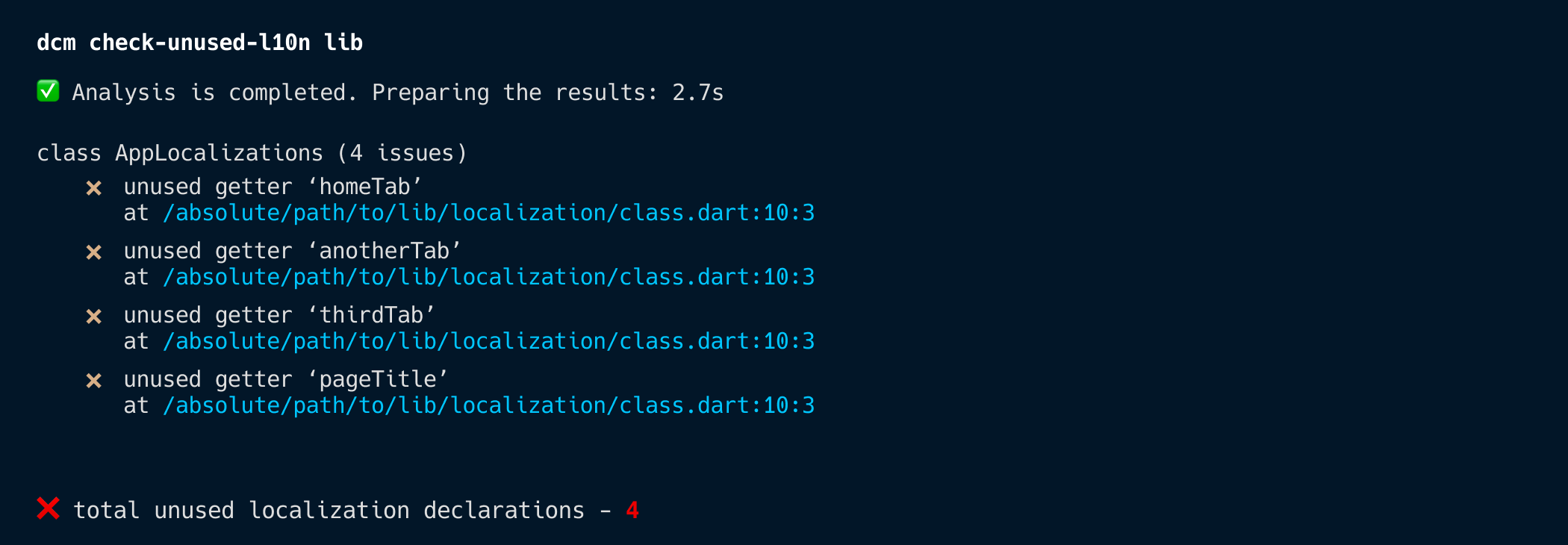Check Unused Localization
Reports unused members of classes that provide localization strings.
This command uses --class-pattern option to find classes that are used for accessing localization string. Passing it is mandatory.
To execute the command, run:
$ dcm check-unused-l10n lib # or dcm ul lib
Full command description:
Usage: dcm check-unused-l10n [arguments] <directories>
-h, --help Print this usage information.
-p, --class-pattern (mandatory) Regular expression for class names to detect classes that provide localization (e.g., ^AppLocalizations$).
-r, --reporter="console" (--output-format) Analysis output format.
[console (default), json, codeclimate, gitlab, checkstyle, sonar]
-a, --absolute-path Show absolute paths in console reporter output.
--output-to="path/to/file" Path to the file with the analysis output.
-c, --print-config Print resolved config.
--root-folder="./" Root folder.
(defaults to the current directory)
-s, --sdk-path="directory-path" Dart SDK directory path.
If the project has a `.fvm/flutter_sdk` symlink, it will be used if the SDK is not found.
-e, --exclude="{**/*.g.dart,**/*.freezed.dart}" Files to exclude (in Glob syntax).
(defaults to "{**/*.g.dart,**/*.freezed.dart}")
--root-exclude Files to exclude, relative to the root folder (in Glob syntax).
--[no-]congratulate Show output even when there are no issues.
--verbose Show verbose logs.
--ci-key The license key to run on CI server. Can be provided via DCM_CI_KEY env variable.
--email The email used to purchase the license. Can be provided via DCM_EMAIL env variable.
--no-analytics Disable sending anonymous usage statistics.
--[no-]fatal-unused Treat unused localization as fatal.
(defaults to on)
Supported Localization Classes
This commands detects unused class members in both simple and auto-generated localization classes:
class ClassWithLocalization {
String get title {
return Intl.message(
'Hello World',
name: 'title',
desc: 'Title for the Demo application',
locale: localeName,
);
}
}
// OR
class AppLocalizations {
AppLocalizations(this.localeName);
...
String get title {
return Intl.message(
'Hello World',
name: 'title',
desc: 'Title for the Demo application',
locale: localeName,
);
}
}
To specify which class is used for accessing localization strings, pass a regular expression pattern to the --class-pattern option.
Read more about different localization approaches in the Flutter docs.
Output Example
Console (default)
Use --reporter=console to get output in console format.

JSON
Use --reporter=json to get output as a single JSON object containing metadata and the list of localization issues.
Format specification
The root object fields are
formatVersion- an integer representing the format version (will be incremented each time the serialization format changes)timestamp- a creation time of the report in YYYY-MM-DD HH:MM:SS formatunusedL10nResults- an array of objectssummary- an array of objects
{
"formatVersion": 10,
"timestamp": "2021-04-11 14:44:42",
"unusedL10nResults": [
{
...
},
{
...
},
{
...
}
],
"summary": [
{
...
},
{
...
}
]
}
The result object fields are
path- the relative path to the file with issuesclassName- the name of the class that has unused membersissues- an array of issues detected in the target class
{
"path": "lib/src/some/class.dart",
"className": "class",
"issues": [
...
],
}
The issue object fields are
id- issue idmessage- the message associated with the issuelocation- the location associated with the issueeffortInMinutes- an estimated effort to fix the issue (in minutes)declarationType- unused member typedeclarationName- unused member name
{
"id": "unused-localization-issue",
"message": "Unused getter someGetter",
"location": {
...
},
"effortInMinutes": 2,
"declarationType": "getter",
"declarationName": "someGetter",
}
The location object fields are
startColumn- the start column of the entitystartLine- the start line of the entityendColumn- the end column of the entityendLine- the end line of the entitystartOffset- the offset of the entity
{
"endColumn": 2,
"endLine": 90,
"startColumn": 1,
"startLine": 48,
"startOffset": 1638
}
The summary-record object fields are
title- a message with the summary entry titlevalue- the actual value of the entry
{
"title": "Total unused localization declarations",
"value": 1
}
Old format specification (prior to DCM 1.26.0)
The root object fields are
formatVersion- an integer representing the format version (will be incremented each time the serialization format changes)timestamp- a creation time of the report in YYYY-MM-DD HH:MM:SS formatunusedLocalizations- an array of unused files
{
"formatVersion": 2,
"timestamp": "2021-04-11 14:44:42",
"unusedLocalizations": [
{
...
},
{
...
},
{
...
}
]
}
The unusedLocalizations object fields are
path- a relative path of the unused fileclassName- a name of the class that has unused membersissues- an array of issues detected in the target class
{
"path": "lib/src/some/class.dart",
"className": "class",
"issues": [
...
],
}
The issue object fields are
memberType- unused class member typememberName- unused class member nameoffset- a zero-based offset of the class member location in the sourceline- a zero-based line of the class member location in the sourcecolumn- a zero-based column of class member the location in the source
{
"memberType": "getter",
"memberName": "someGetter",
"offset": 156,
"line": 7,
"column": 1
}
GitLab
Use --reporter=gitlab to get output in a GitLab-compatible format. To learn how to integrate DCM with GitLab, refer to this guide.
Code Climate
Use --reporter=codeclimate to get output in Code Climate format.
Output example
{"type":"issue","check_name":"unused-localization-issue","description":"Unused getter homeTab","categories":["Bug Risk"],"location":{"path":"lib/src/home_i18n.dart","positions":{"begin":{"column":3,"line":10},"end":{"column":9,"line":14}}},"severity":"major","fingerprint":"1582e402ed53506873775a66a99a0611"}
{"type":"issue","check_name":"unused-localization-issue","description":"Unused getter profileTab","categories":["Bug Risk"],"location":{"path":"lib/src/home_i18n.dart","positions":{"begin":{"column":3,"line":16},"end":{"column":9,"line":20}}},"severity":"major","fingerprint":"fbbf8fd71cb883d03389d4797087bf8e"}
Checkstyle
Use --reporter=checkstyle to get output in Checkstyle format.
Output example
<?xml version="1.0"?>
<checkstyle version="10.0">
<file name="example.dart">
<error line="5" column="3" severity="warning" message="Unused method someMethod()" source="unused-localization-issue"/>
</file>
</checkstyle>
Checkstyle format is supported by Bitbucket. To learn how to integrate DCM with Bitbucket, refer to this guide.
Sonar
Use --reporter=sonar to get output in SonarQube's generic format for external issues.
Output example
{
"rules": [
{
"cleanCodeAttribute": "CLEAR",
"description": "To learn more, visit the documentation https://dcm.dev/docs/cli/code-quality-checks/unused-l10n/",
"engineId": "dcm",
"id": "unused-localization-issue",
"impacts": [
{
"severity": "MEDIUM",
"softwareQuality": "MAINTAINABILITY"
}
],
"name": "unused-localization-issue"
}
],
"issues": [
{
"effortMinutes": 10,
"primaryLocation": {
"filePath": "lib/src/home_i18n.dart",
"message": "Unused getter homeTab",
"textRange": {
"endColumn": 9,
"endLine": 14,
"startColumn": 3,
"startLine": 10
}
},
"ruleId": "unused-localization-issue"
},
{
"effortMinutes": 10,
"primaryLocation": {
"filePath": "lib/src/home_i18n.dart",
"message": "Unused getter profileTab",
"textRange": {
"endColumn": 9,
"endLine": 20,
"startColumn": 3,
"startLine": 16
}
},
"ruleId": "unused-localization-issue"
}
]
}